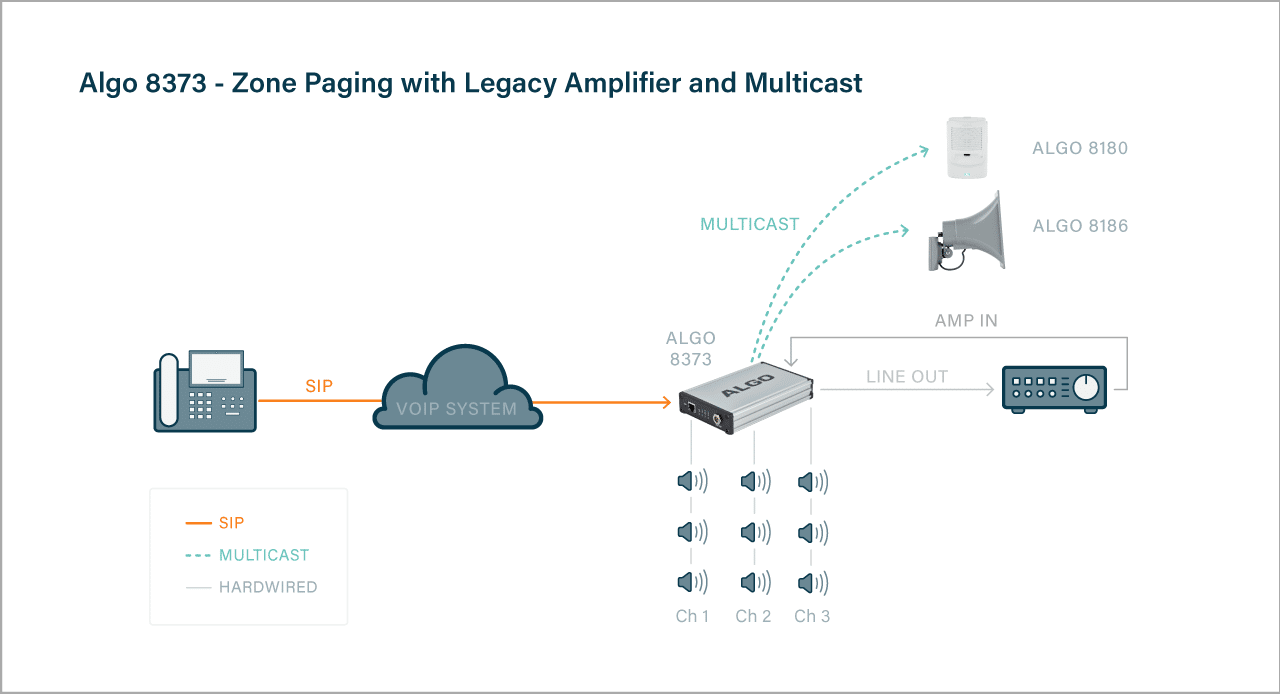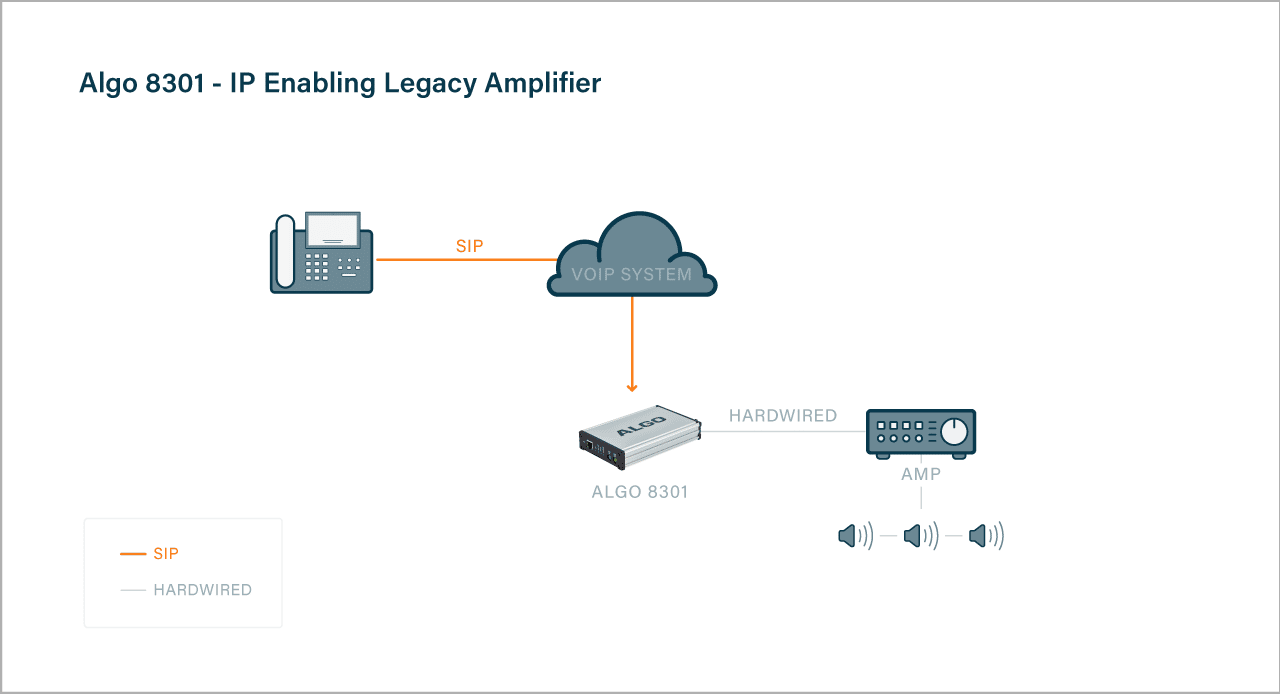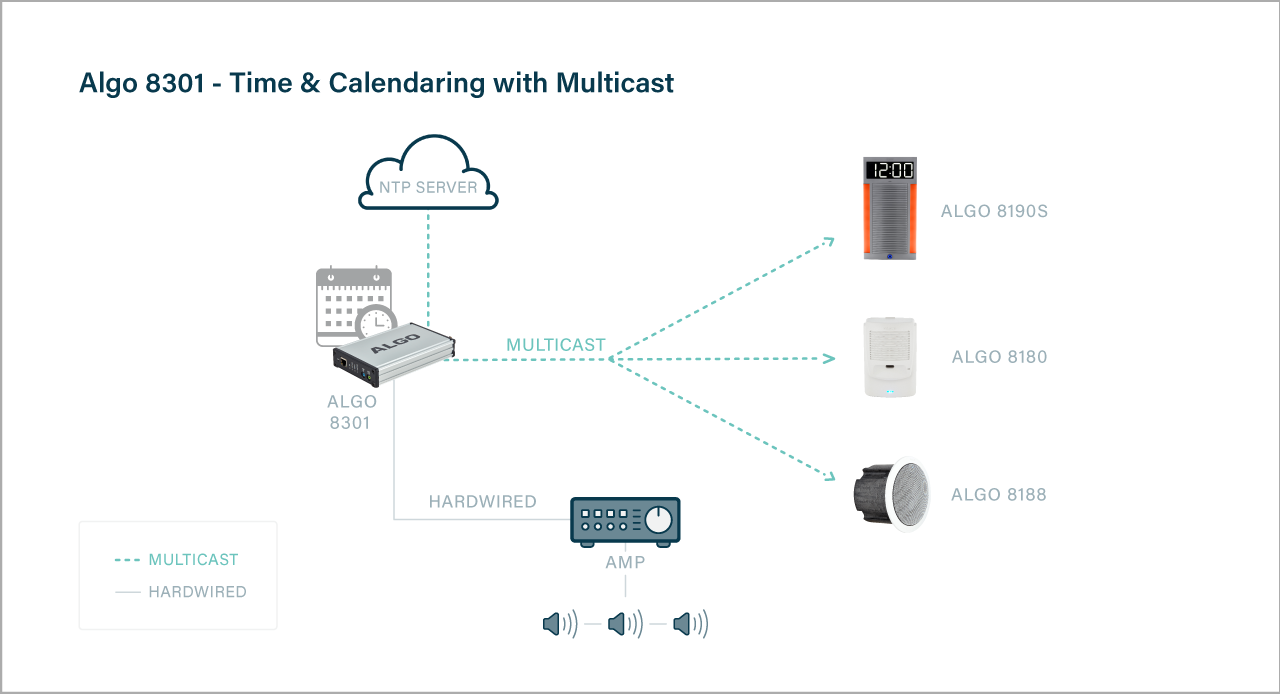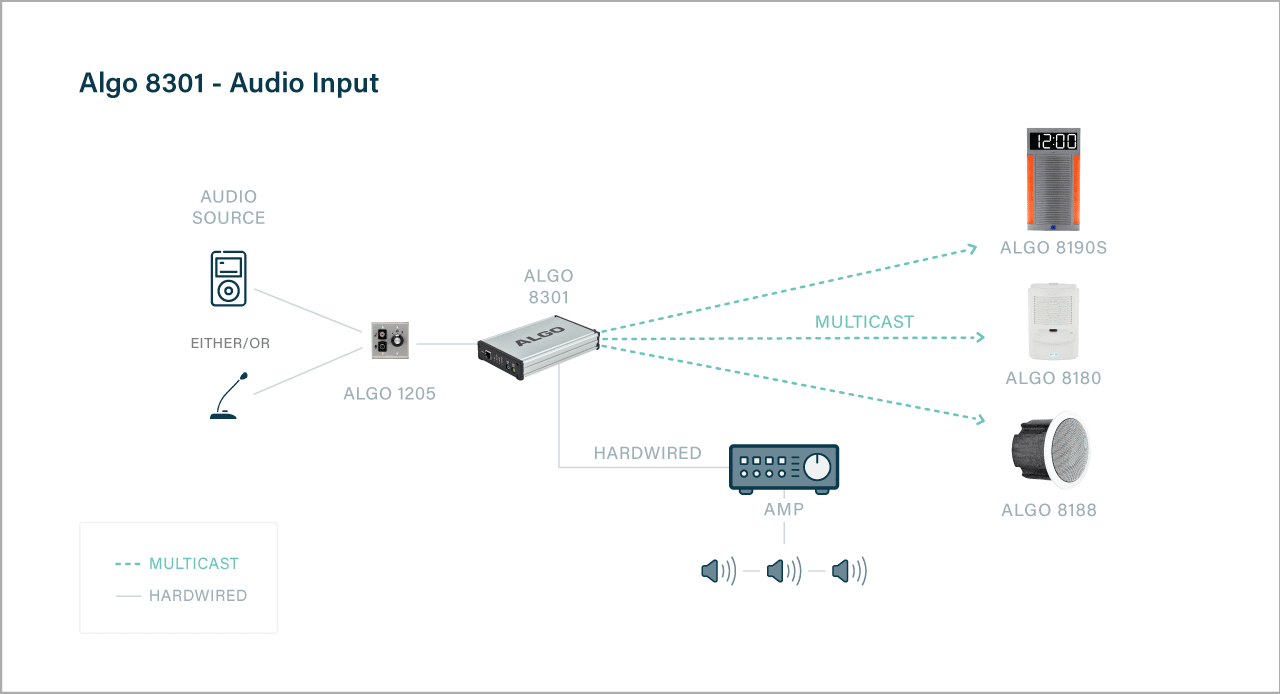Algo IP Paging
Public Address (PA), Bell Scheduling & Emergency Alerting
The Algo IP voice paging and notification system for public address (PA) is a network-based solution that integrates into any SIP-enabled VoIP telephone system. All Algo IP products are 3rd-party, SIP-compliant endpoints. A variety of speakers (wall / ceiling / horn), paging adapters, and visual alerters (strobe lights) are available to suit any PA requirement whether it is a single room or large enterprise / campus environment.

Deploying an IP-Based Paging System
Voice paging is an important element of communication to mass audiences in many locations, including in schools, warehouses, and hospitals. For organizations who have migrated to VoIP environments, deploying an IP paging system is critical to ensure voice paging is effectively integrated and enabled within their VoIP system. With IP-based paging, more features can be accessed, and more actions can be achieved compared to analog paging. While IP paging systems may seem complicated, deploying IP paging is as simple as deploying IP phones.
The Algo IP voice paging system for public address (PA) is a network-based solution that integrates into any SIP-enabled UC or Collaboration System. Algo’s high-functionality IP endpoints for voice paging include a range of IP Speakers, IP Paging Adapters, and IP Display Speakers. Utilizing Algo IP endpoints, organizations can easily deploy effective IP paging integrated into their UC system.
When organizations are looking to deploy an IP paging system, they have two potential routes to consider: to deploy a full IP system comprised of strictly IP endpoints, or to IP-enable existing paging infrastructure (I.e. legacy amplifiers and speakers) with IP Paging Adapters. Full IP systems bring significant flexibility and unlock the complete set of features within IP devices, whereas paging adapters allow organizations to migrate to IP paging with lower upfront costs. Algo devices are all PoE-powered, network configurable, and multicast capable, making them easily deployed, managed, and scaled across different organizations.


How It Works – IP Paging Made Simple
When integrating to a VoIP communication system or unified communications (UC) platform, Algo IP endpoints, such as IP Speakers and Paging Adapters, can be easily installed. These endpoints function as any other IP telephone in a system with a simple configuration. An endpoint is activated when a SIP extension associated to that endpoint is called. Within Algo endpoints, this is referred to as a Page extension, which enables the device to recognize the configured extension and auto-answer when called. Any device living in the UC environment can call an Algo IP Speaker to make a voice page or public address (PA) announcement. All Algo IP speakers have an embedded microphone to support talkback and for ambient noise detection.
Algo IP Speakers are registered to the VoIP system via SIP and are accessed for configuration via web interface which is accessible via the IP address of each individual speaker. If the IP address is unknown, the Algo Network Device Locator can be used to find the IP address of an Algo speaker. The device can also announce this information itself via the DHCP server once it is connected to the network. The device also supports Central Provisioning for registering multiple endpoints in larger enterprise deployments.
Depending on the VoIP system, an SIP endpoint license associated with the UC platform may be required to register the device. One license will be required per extension registered. If multiple extensions are registered to one Algo endpoint, then a license will be required for each registered extension. On a hosted or cloud platform, the extension/seat required for the speaker will be potentially treated the same as any other extension on the VoIP system and incur a monthly cost or similar fee.
Scaling IP Paging with Multicast
Multicast
The Algo IP paging solution can be easily scaled to cover any size room, building, campus, or enterprise environment with multicast.
RTP Multicast, generally referred to as multicasting, allows data or information to be sent simultaneously to numerous IP endpoints through an IP multicast stream. Algo IP endpoints can be preprogrammed to be either a multicast sender or receiver. Multicast senders can initiate a multicast message and broadcast it to the network. Multicast receivers are programmed to listen for multicast messages, and upon receiving a multicast message, the device is activated to play a tone, flash an alert, or initiate a pre-recorded audio file.
With multicast, organizations can deliver a message to many endpoints simultaneously, scaling communication simply and effectively across any environment. Multicast differs from unicast activities (such as a SIP call) in that unicast is a one-to-one messaging system where one message is sent to one device and multicast is one-to-many where one message is sent to many devices.

Multicast provides cost-effective scalability using a minimum of SIP-registered endpoints, as only the endpoint designated to send the multicast needs to be registered. Devices configured to receive the multicast do not need registration.
Zone Paging
Zones are generally created in the Algo paging system using a multicast IP address. Each multicast IP address configured in the Sender endpoint will stream the page audio to the specific group of Receiver devices configured. Receiver devices can be members of any number of multicast zones, including “All Call”. There is no limit to the number and combination of endpoints to include in a given multicast zone. Zones can also be configured to an individual endpoint (e.g., classroom speaker) using SIP registration, thereby allowing for any zone requirement to be generally met with an Algo paging system.

Algo paging endpoints permit up to 50 Page extension registrations per device. This allows for extension-based calling of page zones to be configured (e.g., one-button speed dialing of a page zone from a telephone). Zones can also be configured as DTMF selectable, where only one Page extension is registered to the telephone system. In this scenario, zone paging is selected via the telephone keypad after the device answers the page call (e.g. # 3 for office, # 4 for warehouse, etc.). All Call and Priority Call can be configured using either the extension-based method or DTMF selection.
Integrating IP Phones to Algo IP Paging Systems
Algo IP Speakers, IP Paging Adapters, and IP Visual Alerters all support SIP registration and RTP multicast. Algo IP endpoints seamlessly integrate with most leading UC systems and often coexist with other IP hardware, such as Poly and Yealink devices.
Poly Group Paging – Algo IP endpoints are able to seamlessly broadcast with Poly Group Page. A paging group is a multicast group where every phone on the same LAN that has joined the group can send audio to and receive audio from other devices within the group.
Yealink Multicast Paging – Algo IP endpoints can seamlessly broadcast with Yealink devices using Yealink Multicast Paging. With this solution, Algo devices can initiate a multicast to not only broadcast to other Algo devices, but also to any Yealink phone connected to the network and paging group.
If a Poly Group Page or Yealink Multicast is initiated from a Poly or Yealink IP phone, Algo devices can be configured to receive that message and broadcast it like it would for a traditional multicast stream. By utilizing Poly Group Page or Yealink Multicast, IP paging can be scaled seamlessly between Algo IP endpoints and IP phones.
Legacy Analog Amplifier Integration
Algo paging adapters are designed to IP enable a legacy analog amplifier and speaker infrastructure. These adapters offer a seamless bridge from a VoIP / UC platform to a legacy analog amplifier. Like Algo speakers, the paging adapters register to the telephone system as a 3rd party SIP endpoint. A Page extension on the adapter will auto-answer when called.

An isolated and balanced Line Out on the paging adapters will interface with most traditional amplifiers without any hum or noise. XLR and terminal block Line Out connection options are available to suit most amplifiers.
The 8301 paging adapter is typically designed for a single amplifier / single zone application, although the 8301 will pass DTMF for zoned amplifiers. Where multiple amplifiers are involved, a separate 8301 will be required for each. Using multicast, separately zoned amplifiers can be easily accommodated to stream page audio to the appropriate zone or All Call.
The paging adapters also feature multicast capability to allow for simultaneous audio streaming to Algo IP speakers and to a legacy analog amplifier / speakers as a hybrid paging system.
IP Enabled Amplifier
The paging adapters also feature multicast capability to allow for simultaneous audio streaming to Algo IP speakers and to a legacy analog amplifier / speakers as a hybrid paging system.

Hybrid Paging System – IP & Analog

Zone Paging Adapter
For zone paging, the 8373 paging adapter supports three separate speaker channels using high current internal zone control relays. The 8373 eliminates the need for an external zone control module. For applications with more than three zones on a single amplifier, additional 8373 adapters can be deployed using multicast. Zones can be configured as separate Page extensions or DTMF selectable.

What is the difference between the Algo 8373 and 8301 Paging Adapters?
Scheduled Bells, Tones, Announcements & Music
A Scheduler for automating the playing WAV files (e.g., bells, tones, announcements, music, etc.), can be easily integrated into the Algo voice paging system using the 8301 endpoint. This device uses the NTP server to synchronize with IP clocks, such as the 8190 / 8190S speaker – clock, and is ideal for schools (i.e., class changes, recess, playing an anthem, etc.), retail and healthcare (e.g., store closing, visiting hours, etc.), workplace shift changes, breaks, and transport terminals (e.g., airports, bus, and train stations), etc. Any combination and number of Algo endpoints are compatible with the 8301 to receive a multicast. The audio available from the 8301 can also be simultaneously played via its Line Out to integrate a legacy analog amplifier / speakers and IP endpoints if desired.


Note: The 8301 also offers a 3.5mm Aux In for playing and/or multicasting music from an iPod or similar digital device.
Emergency Notification Alerting
The Algo IP endpoints support alerting of safety, security, and emergency events. There are two activation options available using any Algo IP speaker, strobe light, and/or the 8301 paging adapter:
- Dial an Emergency Alert extension registered on the Algo SIP endpoint.
- Connect a button or similar switch to the Algo device via a relay input.
Up to 10 Emergency Alert extensions are available to register on an Algo IP endpoint. This alerting extension allows for a pre-recorded WAV file announcement and/or tone to be broadcast when the extension is called (e.g., lockdown, evacuation, shelter, all clear, weather or safety event, security alert, etc.). WAV files can be uploaded to 1GB of device memory.
A Call to Cancel feature is available to allow the emergency alert to play continuously for as long as desired until canceled. Alternatively, the WAV file alert can be configured to play for a pre-set duration. The user does not have to remain on the telephone when calling the Emergency Alert extension. As soon as the call is made the Algo endpoint will play the WAV file as configured, making emergency alerting simple and efficient from any telephone or device in the UC environment. Once the Call to Cancel extension is configured, the same canceling extension will apply to any of the Emergency Alert extensions registered.

As an alternative option for emergency alerting, any button or accessory providing a contact closure, including the Algo 1202 and 1203 buttons, can interface to the relay input of an Algo IP speaker, strobe light, or 8301 paging adapter. Single twisted pair 24 AWG wiring is used to connect a button. Three configuration options are available via endpoint’s relay input upon activation:
- Play and/or multicast an alert.
- Call a target extension and play a discrete WAV.
- Call a target extension and have a two-way call via the speaker’s microphone.

Power for the Algo 1202 and 1203 buttons is provided by the available PoE from the Algo IP endpoint.
Any combination and number of Algo IP endpoints can be configured as a multicast for emergency alerting to cover any size room, building, campus, or enterprise.
IP Visual Alerting for Enhanced Situational Awareness

The 8190S IP speaker – clock and 8138 multi-color strobe light are four colors LED visual alerting devices. These endpoints offer color options including amber, blue, green, and red.
Together with Algo IP speakers and/or the 8301 paging adapter, visual alerting compliments notification of safety, security, and emergency events. Device configuration allows a visual alert color to be aligned with the broadcast of an alert tone / announcement to enhance situational awareness. For example, Amber – Shelter, Blue – Evacuate, Red – Lockdown, Green – All Clear. The LEDs can be configured to light independently or in combination to meet color choice requirements. In addition, a variety of flash patterns are also available to choose from including three brightness levels to suit the application environment.
Monitor and Manage Your IP Paging Devices Seamlessly
When deploying Algo IP endpoints for IP paging, managing devices is as simple as logging into the web interface of each individual device. However, in large deployments where hundreds of devices are installed, organizations typically like a single pane view to manage devices. In such cases, using a tool to manage and monitor all devices in a single place is the preferred option for usability, simplicity, and time efficiency. Algo’s devices are designed to seamlessly integrate into both small- and large-scale environments and has the management tools and capability to operate easily in either.
Algo has three solutions for device monitoring and management:
- using the web UI for individual device monitoring,
- using the 8300 IP Device Manager for on-premises device monitoring,
- and using the ADMP for cloud-based device monitoring from any location.
Web UI / Remote Configuration
Each Algo device has a unique web interface for the configuration of device settings. The user-friendly web interface provides a way to easily customize the performance of a device to meet the needs of any environment.
Through Algo’s intuitive web interface, IP endpoints can be deployed in any IP-based UC, Collaboration, or Mass Notification environment and their settings can be easily adjusted. With remote configuration, it is easy to deploy, adapt, and understand what is going on in the ecosystem.
Remote configuration requires no additional software. The web configuration portal can be accessed via the IP address. As long as a user has network access, the user can easily change configuration settings on the device, such as the multicast zone, speaker volume, or flash patterns.
8300 Controller
The 8300 Controller provides centralized device monitoring and supervision of Algo IP endpoints, particularly where higher system reliability for mission-critical voice paging / public address (PA) and emergency notification systems is required. The 8300 can help to minimize downtime as an efficient, time-saving tool for management and problem resolution of Algo IP endpoints.
ADMP
The Algo Device Management Platform (ADMP) is a cloud-based device management solution to manage, monitor, and configure all registered Algo IP endpoints from any location. Devices are continuously monitored for connectivity, and an email-based notification is issued when a device goes offline. This allows for real-time supervision of device status.

With a list of management activities, an end user or service provider can push to update configuration settings, troubleshoot devices, and upgrade firmware. Devices can be easily grouped via the tagging functionality to be overseen by district, department, and/or functionality. The ADMP is a helpful tool for both service providers and end users to effectively oversee all Algo IP endpoints deployed in a large environment or over multiple locations and networks.


